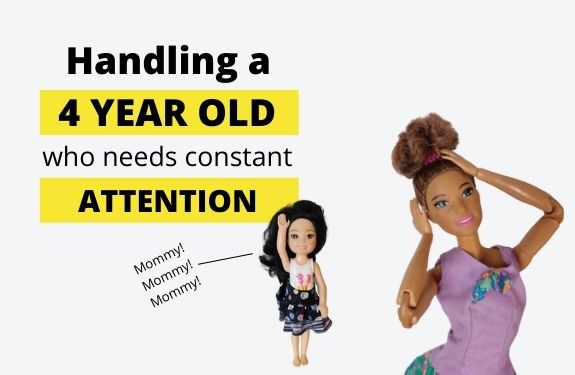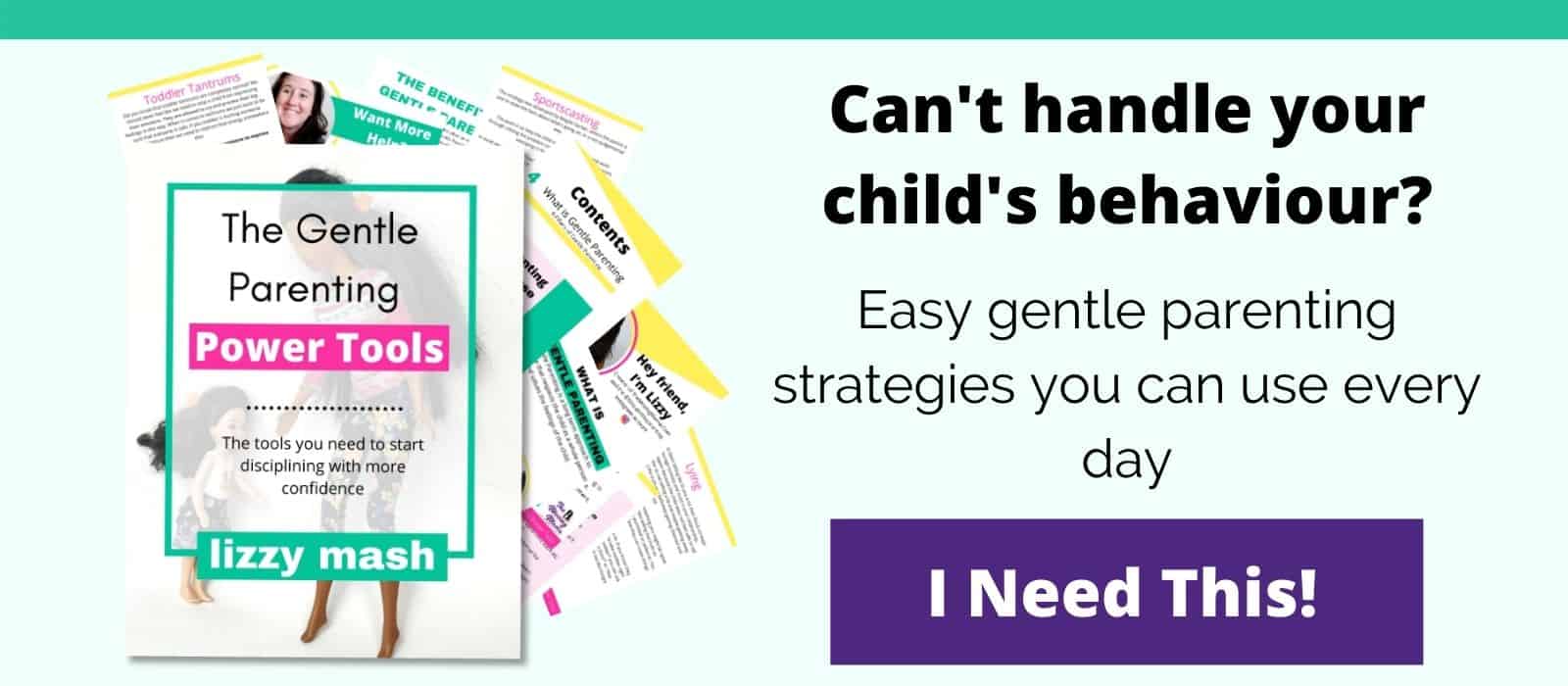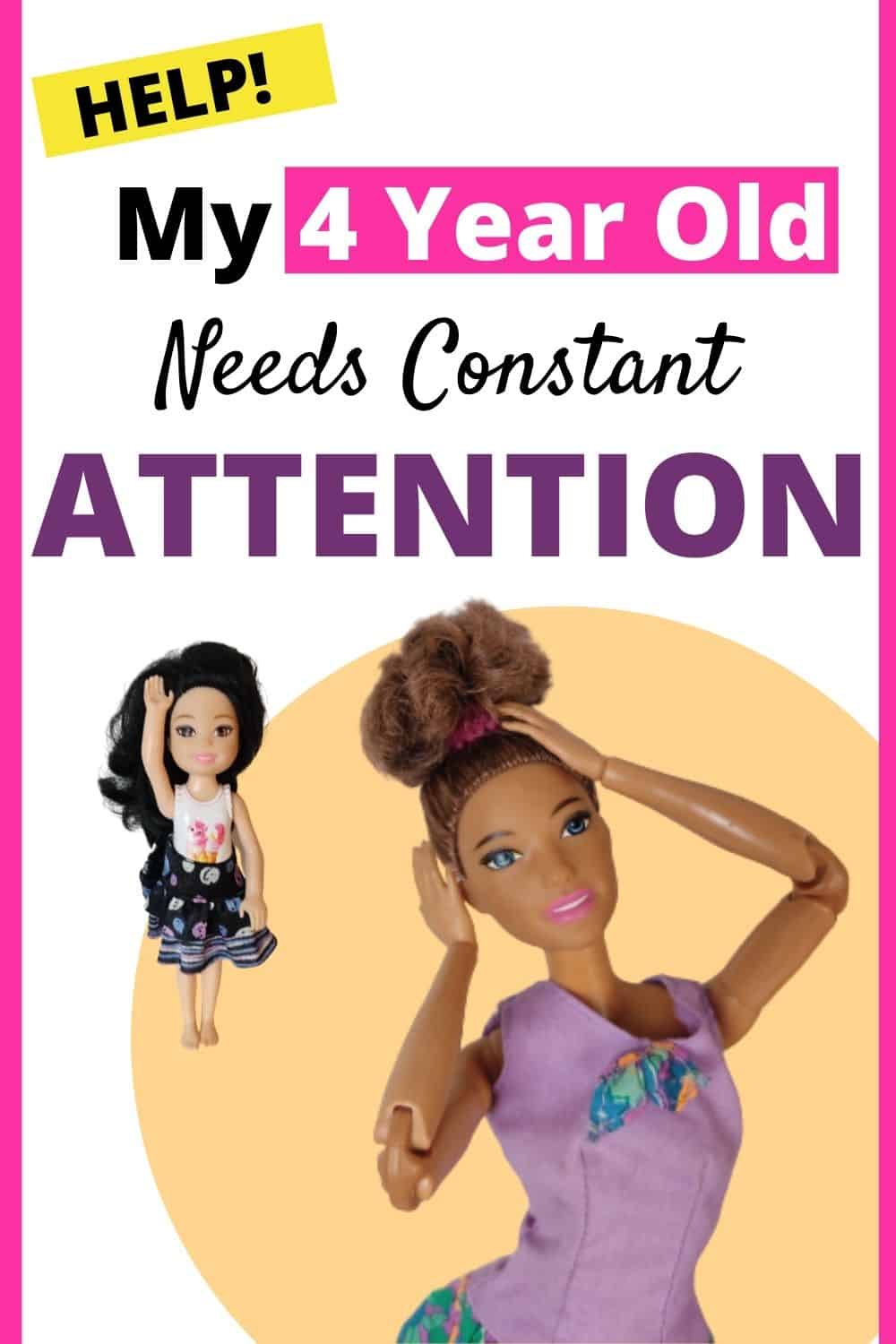Inside: Does you 4 year old exhibit attention seeking behaviour? Here’s what to do if your 4 year old needs constant attention. This post may contain affiliate links. Read more information here.
This Is How To End 4 Year Old Attention Seeking Behaviour
Are you familiar with this situation? You are trying to talk on the phone or cook dinner, but your 4 year old just.won’t.stop.talking.
They’re always trying to get your attention to look at what they’re doing, or tell a really long (and slow) story.
It can be exhausting if your 4 year old needs constant attention, especially if it means they don’t play by themselves very much.
Read on to learn a respectful approach to handle a 4 year old who always needs attention.

It’s normal for 4 year olds to want attention
First up, it’s important to acknowledge that it’s totally normal for a 4 year old to want attention – yes, even a lot of attention.
Children need connection with their loved ones. It builds a strong foundation of security and love. It can help a lot if you shift your perspective from “attention seeking behaviour” (which usually has negative connotations) to “connection seeking behaviour.”
It’s ok if they want to be in the same room as you all the time. It’s ok if they always want to be involved with what you’re doing. It’s ok if they always want you to watch them closely when they play.
These feelings that they have are all allowed. It’s all ok.
But it’s also ok that you’re not always able to give them that attention and may need to create boundaries that work for you, while still giving them the attention they desire.
The amount of attention they want might not be reasonable for you, but it’s important to accept that it’s ok that that’s what they want.
Solutions when 4 year old needs constant attention
There’s nothing wrong with your 4 year old wanting attention, but you might need some solutions to make it more reasonable for you.
Involve your child in what you’re doing
You don’t always have to stop what you’re doing to give your child attention in the way they want it, you can also involve them in what you’re already doing.
This might make your task take longer, but it’s like killing two birds with one stone – you’re getting the task done (eventually) while also giving your 4 year old the attention they want.
Simplify your life
It might feel hard to give your 4 year old the attention they want not because they want constant attention, but because you’ve made yourself too busy. Look at your life and consider if there are things you could make easier or cut out from your schedule so you can have more time to give to your kid.
I have a friend who started doing grocery pick up because even though she likes grocery shopping she realized how much time she could save, and instead she now spends that time with her kids. There are little ways that can help you feel less overwhelmed and torn between doing what needs to be done, and also giving your child the attention they want.
If you haven’t tried grocery store pick up yet here is a great list outlining different services available in the States.
Send them to do a task
You can connect in a distant way sometimes. If you’re busy and they’re trying to play with you, you can ask them to go build you a car out of blocks, and when they’re done building it you play with it together.
Understand the importance of quality over quantity with attention
In your child’s eyes there’s a huge difference between sitting on the sidelines at the playground for an hour while you’re on your phone vs 10 minutes of pretending to be dragons together.
I’m not saying you always have to playing with them, but when it comes to attention it’s about the quality, not the quantity. If you’ve spent the past 5 hours in the same house together but haven’t interacted in a very focused, intentional way then you might be frustrated that your 4 year old needs constant attention after that, but it’s because the attention they need should be quality over quantity.
A little bit of attention can go a long way to fill your child’s need for attention as long as it’s quality, focused attention.
Give short bursts of attention
Along similar lines as the previous point, it can be very valuable to give your child short bursts of attention that’s even just under 1 minute. This can be really helpful if they need attention when you’re busy with something they can’t help you with.
You can turn to them and get to their level and give them a big hug, tell them how much you love them. This burst of attention may be short, but it can help them to hold on and wait until you’re available for a longer time together.
Set and keep boundaries
If you’re familiar with Gentle Parenting yet, you’ll know that firm limits and boundaries are an important part of this strategy.
If you’re confident that you are giving them enough quality attention, it’s ok to set boundaries in the moments that you’re not able to.
It’s ok to say, “I know you really want me to come play with you right now, and I love playing with you, but right now it’s really important that I put the baby down for their nap. As soon as they’re sleeping though I’m going to come play with you.”
You might not be available to give them attention because you have to put the baby down for a nap, but it also might because you really need a break right now to finally drink your coffee and get in the right mindset for the rest of the day. Their feelings for attention are valid, but your need to rest for a moment is also valid.
Boundaries can be very necessary, as long as you feel confident that you are giving them enough attention, and true connection, overall.
What to avoid with an attention seeking 4 year old
When it comes to a 4 year old who needs constant attention there are some things you should avoid, and ignoring them is #1 on the list.
It’s popular advice that if a child is demanding for your attention all the time that you should just ignore them and eventually they will stop.
This advice might make sense, but it’s only putting the parent’s needs into consideration and forgetting that “attention” is actually a need for the child as well. Ignoring them a lot might make them stop asking for attention, but it won’t make the need go away.
Should our time be more precious than theirs that we demand they leave us alone? This can lead to anxiety on their end because they won’t know when they’re welcome to spend time with us. This is an unmet need.
So no, ignoring them is not a good option, but remember from above that boundaries are ok.
How to handle constant interruptions from 4 year old
What should you do if your 4 year old is always interrupting you in an effort to get their attention needs met?
It’s quite common that as soon as you start talking to someone else that that’s the moment you child suddenly needs to talk to you. Making sure you give them enough attention throughout the day to can help prevent this, but it also just seems inevitable as they want to join the conversation or see you connecting with someone else so that suddenly want that at that moment too.
You should take some time to talk to them about interrupting and how they can appropriately get your attention without interrupting. Some families teach their child to place their hand on the parent’s arm, and then the parent will touch back – this signals to the parent that the child wants to talk and the parent’s touch signals that they heard them.
You could also teach them to say, “Mommy, I want to talk to you,” And you respond by saying, “Ok, I will talk to you soon.”
It’s important then to not make them wait long before you do turn your attention to them. If you take a long time it might be hard for them to keep waiting and they’ll interrupt even more, but if you don’t make them wait long then it can be a positive experience where they’ve learnt, “Hey, I actually am capable of waiting.”

How to handle destructive or aggressive attention seeking behaviour from a 4 year old
Not all children will be happy with your boundaries of course, and some might become destructive or aggressive to get attention. Maybe they start breaking stuff (because they know you’ll respond) or start hitting you (because they know you’ll respond).
Popular advice might tell you not to “reward” this behaviour by giving them attention.
What if you think of it like this though, if attention/connection is a need, and your child didn’t get that need met, doesn’t it make sense that they would become frustrated and basically do “whatever it takes” to get that attention?
They might not be able to actually say to you, “I just need some attention,” but that’s often that deep need inside of them. When that need isn’t met for a long time in a profound way, they can start to resort to desperate measures.
Understanding this will help you figure out your response, because first of all this kind of behaviour can act as a signal to you – a signal that they truly do need more attention from you, and maybe you need to adjust things to make sure you’re actually giving them their needed attention.
Second of all though, you do actually have to respond to this behaviour. You can say something like,
“Wow, let’s take a pause for a moment. I know you’re really upset that I can’t play with you right now but I won’t let you hurt me. I do loving playing with you, but right now it’s really important for me to finish cooking. It’s really hot so you can’t help, but do you want to sit on the counter and watch?”
In this example the parent would be validating the child’s feelings while still holding the boundary. Even though this interaction would be considered a correction, part of discipline, it can still serve as giving the child some connection.
It’s not rewarding their behaviour though, it’s not like the parent is now just giving in to what the child wants because they became aggressive. The boundary is still there, but there is also compassion and love.
How to stay calm when 4 year old is demanding constant attention
How can you learn to stay calm when your 4 year old needs constant attention? The truth is that on paper this doesn’t sound so bad, but in reality it can be very overwhelming and annoying for you.
It can feel this way because it might seem like your boundaries are being pushed by your child, which can make you even feel angry.
This can cause you to react instead of respond to your child, but they need a thoughtful response and not an emotion driven reaction.
To stay calm when your 4 year old needs constant attention it can help to remind yourself that they’re seeking attention because it’s a need, and that you are capable of supplying this need for them. You can acknowledge the need while also maintaining the boundary set in place.
Remember your boundary, and that your child does not have the power to boss you around (and you shouldn’t boss them around either). Your child is entitled to their need for attention, and you’re entitled to your necessary boundaries.
Keeping this all in mind will help you to stay calm when your child is demanding attention.
Conclusion About 4 Year Olds Who Need Constant Attention
In the end, when it comes to a 4 year old who needs constant attention there are three things to remember.
#1. It is normal and acceptable for your 4 year old to want a lot of attention from you
#2. It’s acceptable for you to have your own boundaries
#3. Think quality over quantity when it comes to the attention you give your child
Apply this knowledge when facing your 4 year old who needs constant attention and you should see a big difference.
How to Handle an Attention Seeking 4 Year Old

More Posts About 4 Year Old Behaviour
4 Year Old Doesn’t Listen? The Easiest Approach
